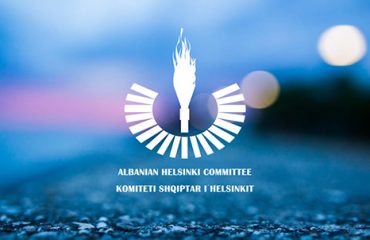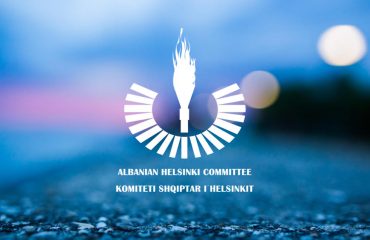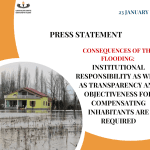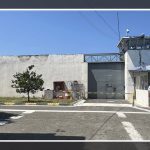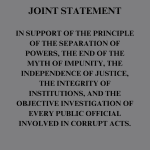Interview with Erida Skëndaj, Executive Director of AHC
- How would you as part of the Albanian Helsinki Committee evaluate the
mission of this organization since its foundation in 1990 being the first
to be established for monitoring respect of human rights and freedoms in
Albania?
The establishment of the first non-profit organization on December 16, 1990, initially labeled as the Forum for the Protection of Human Rights, generated a special resonance, domestically and abroad. The activity in support of citizens’ rights and freedoms drew the attention of the International Federation, based in Vienna, which admitted this forum as its member. Ever since that time, the Forum was called the Albanian Helsinki Committee.
In the first years of democracy, the mission of the organization was very decisive; in the circumstances of a very fragile and newly established democracy, violations of human rights and freedoms were more numerous. The peculiarity of AHC’s activity consisted in the fact that the organization had been conceived as an organization that had a monitoring character and an opponent of the state every time the latter violated citizens’ rights. Although experience was scarce in the beginning of the organization’s activity, the archive of AHC boasts a series of research studies, public reactions and interventions with state authorities, in protection of human rights and freedoms.
- Twenty six years have elapsed since AHC’s foundation. Seeing
things from the first days up to noë how has the issue of human rights
developed, and which is the role played by your organization?
As I mentioned earlier, during the first years of democracy, AHC’s mission in protection of human rights and freedoms was not easy. Its first appeal was the one for the release of all those imprisoned and interned for political motives. The founders of this committee, known intellectuals from different fields and with extensive reputation in the country, did not only issue the statement; they also traveled and monitored the situation in the prisons and camps of the time. The initiative reverberated domestically and abroad and was even covered in numerous international media outlets of prominence at the time, including the “Voice of America.” At the time, it was also supported by representatives of democratic countries in Europe and the United States of America. Taking into consideration the appeal mentioned above, in 1991, the Assembly of Albania decided on the rehabilitation of those who had been politically imprisoned and interned. Naturally, it was not only the AHC Statement that led to this decision.
During these past 26 years, AHC ahs been and continues to be a non-government, non-partisan organization that never sided with any political party and was never influenced by any political force or factor. This is the most important factor that has characterized us in our activity, in spite of the various changes and improvements that the situation of respect for human rights and freedoms in the country may have seen. During these 26 years in a democracy, which also coincide with AHC’s experience, the organization has provided professional and pro-active contribution toward public reactions on violatiosn of the rights and freedoms of citizens, proactive monitoring in the prison system, police, judiciary, elections, and the rights of vulnerable groups of the society, recommendations addressed continually to state institutions with regard to improving human rights, the provision of legal critique in the process of drafting laws, the representation of cases in the Constitutional Court, whereby we have sought the complete or partial unconstitutionality of certain legal acts and by-laws, the legal education of citizens about their human rights and freedoms as well as the means to seek them, training for public administration personnel, etc.
- How can you describe your relations with consecutive governments and
political forces of the left or right- wing or others at different
periods of time in carrying out your mission? Have you ever been faced with
governments’ or other forces’ pressure in exercising your tasks?
Based on research into the rich archive of AHC as well as on the basis of conversations with former founders or members of the Committee, I have created the conviction that its activity has not been easy. In the beginnings of its activity, the concepts of democracy were embryonic and the partisan clash between the majority and opposition was tangible. Also, the need for changes in legislation was indispensable. Particularly during the first years until the approval of the Constitution, one noticed arbitrarity, violations of human rights and freedoms in different sectors. As it results from documentation, the political parties and governments of those days did not like AHC reactions in defense of human rights and against violations committed mainly by state bodies. This appears to be one of the reasons why AHC was attacked for bias by media outlets of the time. However, AHC did not step back as a result of denigrating attacks, in spite of influences by government camps. It results that AHC was particularly attacked because it denounced the manipulation of elections that it monitored in 1996 and some arbitrarities that took place in 1997.
At a time when Europe was seeking the approval of Protocol No. 6 of the ECHR, for the elimination of death sentence as an obligation deriving from the country’s membership in the Council of Europe, and while the Albanian Parliament was dragging out the fulfillment of this obligation, in the third quarter of 1999, through a public statement, AHC called for the elimination of the death penalty. One day after the Statement, a political party media outlet read, “Helsinkis defend criminals.” It is the merit of the members of the time that the Committee, unshaken in their motivation, carried on with the mission sanctioned in its statute for the protection of the rights and freedoms of citizens.
Even during the year 1997, in the conditions of the state of emergency, AHC addressed the Constitutional Court three times to declare unconstitutional some legal provisions of the time. After 1998, i.e. after the adoption of the Constitution, the activity of AHC expanded, and even governemnts and parties in power, left-wing or right-wing, reduced their destructive criticism toward AHC. The reduction of such criticism may be attributed to the natural developments that democracy and the rule of law experienced. AHC continued even after 2000 to address the Constitutional Court with a request to invalidate this or that law that, in AHC’s opinion, was not compatible with the Constitution, independently from whether left-wing or right-wing forces were in power.
Independently from the fact whether someone liked or not the criticism addressed to the state in the past 26 years of activity, this has not stopped the Albanian Helsinki Committee from carrying on with its jounery to fulfill its mission. In fact, it may be said that such criticism has often motivated it even more to carry out its duties. We have felt appreciated anytime the data or findings of our work have been mentioned in important international reports, such as the United States Department of State Report on Human Rights, the Amnesty International reports, the Progress Reports of the European Commission, reports by international organizations in the field of media, etc. These citations are are an important indicator of the impartiality of our work.
- How much popular is AHC among ordinary Albanians and, on the other
hand, how much have you been able to promote the role of the organization
among the people?
You can never have enough, but I can say without hesitation that the role of AHC is felt in every city, without any distinction in terms of geographic spread. The number of citizens that turn to AHC for consultations or complaints is growing. On behalf of victims or discriminated persons, we have represented cases in court, we have addressed the Constitutional Court and the Strasbourg Court, and we have reacted on different violations. It is precisely these and many other principled stances that have increased citizens’ trust in this organization.
The reports of this Committee with regard to the observation of elections have been objective, no matter who won and who lost. The sensitization of citizens with a simple and understandable language to make them aware of laws has been a practice for some time now. This has increased the Committee’s influence on and support for it in various population strata. The work is voluminous while the staff carries out admirable work with maximal commitment. Our achievements rely on the volunteer groups that are numerous, young people, students of the School of Law, experts of the health care sector, or other areas.
- As 2017 has started it is natural the readers’ interest to know
Which are some of the findings of AHC during 2016 with regard to the
situation of respect for human rights and freedoms in Albania?
During 2016, AHC reacted publicly in 45 cases, namely 17 times based on information obtained through the media, in 7 cases on citizens’ complaints, and in 21 other cases based on monitoring carried out by the organization itself. Reactions focused particularly on conditions and the treatment of persons deprived of their liberty in the penitentiary system, cases of security violations in prisons, cases of violence toward women and children, the need and importance for citizens of reforming the justice system and electoral reform, reactions on protecting investigative journalism and respect for freedom of the press, the need to avoid hate speech in parliamentary sessions, criminality, etc.
During 2016, we addressed over 280 complaints. Namely, 50% of these cases are dominated by complaints of persons deprived of their liberty in prisons and pre-trial detention facilities, about inappropriate conditions and the violation of the rights of these citizens by the prison administration, failure to provide health care services, claims of use of violence, etc. Of these, 15% are attributed to the judicial system, unjust judicial decisions, corruption of judges and prosecutors, the violation of due legal process, unjust and arbitrary actions by the prosecutor’s office, etc.
Accommodation in the prison system of a group of about 175 mentally ill persons, remanded to a medical measure of “Compulsory medication in a health institution,” represents a serious violation of their rights and has led to an aggravation of the state of their mental health. AHC is representing a case in the Strasbourg Court, which we consider will provide the necessary solution for this problem.
Complaints in the media and those directed at AHC highlight that citizens face cases of careless medication, injury to health and loss of life in traffic accidents, crimes against life, trafficking in human beings, etc. Complaints also address structural problems that continue to affect the public health care system, such as the lack of medicaments or of medical infrastructure. Monitoring of living conditions of the Roma minority and the Egyptian community highlighted that these communities, live in conditions under the sustenance level, which is yet to be established through laws and by-laws by the state.
AHC monitored some judicial hearings on corruption. Defendants accused of corruption in the public sector, in almost all cases, belong to the low or middle level. Impunity of high-level officials remains a concern for the country.
AHC continues to sensitize groups of interest and monitor the implementation of an important law that envisages the obligation of public bodies to announce and conduct public consultations about different draft acts, draft strategies and policies of public interest. Based on monitoring conducted in 20 central institutions (19 ministries and the institution of the Prime Minister’s Office), it results that the consultation of draft acts is not realized in keeping with procedures and deadlines and, in some cases, it has a formal character. There is information that there are still journalists who work under informality, whose salary is not paid regularly or who do not benefit social and health insurance. The Albanian Helsinki Committee, the association ProLGBT and Civil Rights Defenders have made calls for respect for freedom of the press and the prohibition of censorship and self-censorship.
- Albania will hold general elections in June this year. Generally
speaking there have alëays been irregularities of different sorts
although progress has been made if we compare things with 27 years ago. How do you
assess the current pre- electoral situation when less than five months
have remained from the day when Albanians will cast their votes?
For these elections, just as for previous elections, we will be one of the organizations that the CEC will accredit as a domestic monitoring organization. From April 2016, we have sent to the ad hoc parliamentary Committee on Electoral Reform 32 recommendations for the improvement of electoral legislation. AHC has made public appeals for the intensification of work by this commission. Electoral reform is late and there are only a few months away from the parliamentary elections of June 18.
In my opinion, the pre-election situation is worsened by disagreements between political forces and excessive polarization. It is not in favor of the country or the people or Albania’s image for this tension to continue. Dialogue and consensus are needed for the solution of issues. That is the only way to achieve the required standards. The contribution of AHC as well as other domestic organizations, although important, is modest. OSCE/ODIHR has expressed appreciation of domestic observers in this regard. In all elections, there have been violations, sometimes more and other times less, but polarization and politicization to some extent have harmed standards. The elections after the approval of the full legal package of justice reform are also a test for the country’s integration into the EU.
- What can you tell our readers on your cooperation with other similar
organizations in different countries? How much have you profited from
others’ experience in various fields of protection of human rights?
In these recent years, our relations with partners in the region, such as Kosovo, Macedonia, and Serbia, have been intensive and productive. An important initiative in this regard has been the joint monitoring, together with regional partners, of the rights of persons in penitentiary institutions and psychiatric hospitals. The participation of AHC in the international network Civil Solidarity Platform, which brings together a series of non-profit organizations engaged to improve human rights in Europe, Eurasia and the United States, has given us the opportunity for exchanging experiences and strengthening ties with partner organizations that we share goals and activities with. We have come together in public reactions on many of the causes of these organizations in countries that face serious human rights violations.
Also, soon we expect the start of a new initiative led by AHC in the fight against extremism and radicalization in Albania. Our board of collaborators to assist us in this initiative will include the Norwegian Helsinki Committee, the Dutch Helsinki Committee and the Serb Helsinki Committee as well as the local organization Togetehr for Life. Cooperation with known partner organizations in Europe and the region will be value added in obtaining the best expertise for the implementation of this project.
- As ordinary citizens how do AHC’s staff feel themselves in carrying
out such a mission? Which could have been some bad experiences or good
ones, and has any of them affected the private life of anyone of the
staff?
As I mentioned above, the very large number of work that the organization carries out is not matched by staff that is large in numbers. The Assembly and public bodies often send us important draft laws to solicit our opinion before they are approved. We welcome this kind of appreciation of our work. However, the deadlines are very tight and we find elements of formalism in the consultation process. On the other hand, in order to prepare legal review of these draft laws, the AHC staff has to dedicate research, knowledge of our legislation as well as legislation of other democratic countries, etc.
The workload is very large and often we are obliged to take away from our own free time in order to give maximal dedication to the very worthy work for the protection of citizens’ rights. In this regard, I can say that everyone of us gives up some of our private lives. However, this is the kind of work that is done with a lot of passion and motivation by AHC staff. It is also the type of work that gives you satisfaction, especially when violated rights are reinstated, in those cases when authorities respond positively to our recommendations. Cases won through judicial routes are no doubt one of the positive indicators of our work, even in front of the Strasbourg Court. This has motivated us to move forward and increase and strengthen our capacities every day.
- To conclude has AHC’s performance been since its foundation a
mission accomplished or an ongoing mission?
If you look objectively at the activity of AHC, or generalize its history through different periods, it has undergone changes mainly in the organizational aspect in carrying out the duties for the implementation of initatives and activities of the organization. In recent years, some of the violations are not easy to observe as they were during the first two decades of democracy. Some of these violations are more sophisticated and work to identify and engage on them is not easy. With the evolution of forms of violations, the methodology and forms of our activity have also evolved, responding to the best of our capabilities to the citizens’ requests for their rights and freedoms. What I think has remained unchanged in our mission as been and remains the protection of human rights and freeomds, the strengthening of the rule of law.





